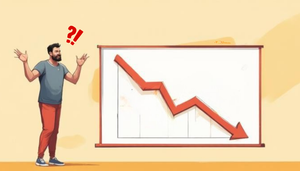
Do these sentences resonate? 👇
- “I want to invest but don’t know where to start.”
- “Everyone online makes investing sound easy, but I’m scared of losing money.”
- “I'd like to start, but is it even worth it if I can only invest a small amount?”
Investing can seem intimidating, especially with all the noise online and pressure to “build wealth early.” But understanding the basics is the first step toward making your money work for you. Let’s break it down together.

“You don’t have to be wealthy to invest, but you have to invest to be wealthy.” – Mellody Hobson
What is investing?
Investing means putting your money into assets—like stocks, bonds, or funds—with the goal of growing it over time. Unlike saving, which is about safety and access, investing is about potential growth and accepting some risk. 📈
Why does investing matter for Gen Z?
- According to Fidelity, 72% of Gen Z want to invest, but only 28% actually have investments so far.
- Deloitte reports Gen Z is more likely than any previous generation to use investing apps and social media for financial advice, but 63% say they feel anxious about getting started.
- The average Gen Z investor starts at age 19, but many wish they’d learned more about the basics before jumping in.
What are your options when investing?
- Individual Stocks: Buying shares of a specific company. High potential reward, but also higher risk. You’re betting on one company’s success.
- Index Funds & ETFs: These are baskets of stocks or bonds that track a market index (like the S&P 500). They’re low-cost, diversified, and recommended by most experts for long-term growth.
- Managed Services: Robo-advisors and professional managers pick and balance investments for you, often for a small fee. Good if you want a hands-off approach.
- Bonds: Loans to companies or governments. Lower risk, but usually lower returns than stocks.
- Crypto & Alternatives: Digital assets and other non-traditional investments. These can be very volatile and risky—don’t put in more than you can afford to lose.
What are some different strategies?
- Long-Term, Low-Cost Index Fund Investing: Many experts (and billionaire investors like Warren Buffett) recommend putting most of your money in broad, low-fee index funds. Historically, these have outperformed most active stock-pickers over time.
- Dollar-Cost Averaging: Invest a set amount on a regular schedule (like $20 every month), no matter what the market is doing. This takes the stress out of “timing the market.”
- Diversification: Don’t put all your eggs in one basket. Spread your money across different types of investments to reduce risk.
- Active Trading: Buying and selling stocks frequently to try and beat the market. This is risky, time-consuming, and not recommended for beginners.
How much do you need to start?
- Start small, grow big. Many apps let you invest with as little as $1. Fractional shares mean you don’t need big bucks to own a piece of your favorite company or fund.
- Small amounts add up. If you invest $25 a month and earn an average 7% annual return, you could have over $3,000 in 5 years and nearly $30,000 in 30 years—just from small, consistent contributions. 📊
What about fees and taxes?
- Watch out for fees. Account fees, trading fees, and fund expenses can eat into your returns. Look for low-fee options.
- Understand taxes. You may owe taxes on investment gains, even if you reinvest the money. Tax-advantaged accounts (like Roth IRAs) can help your money grow faster.
How do you avoid common mistakes?
- Don’t chase “hot tips” or trends you see on TikTok or Reddit. 🚩
- Avoid putting in money you can’t afford to lose.
- Have a plan and stick to it, even when the market gets bumpy.
Why does time matter so much?
- Compound growth is your superpower. The earlier you start, the more your money can grow—because you earn returns on your returns, year after year.
- Time in the market beats timing the market. Consistency wins over trying to guess the best days to buy or sell.
Investing isn’t about being perfect or rich—it’s about building habits, learning as you go, and letting your money work for you over time. 🌱

“The stock market is filled with individuals who know the price of everything, but the value of nothing.” – Philip Fisher
Take a moment to reflect on your own approach to investing. Here are five questions to help you explore your relationship with money and risk:
- What are YOU hoping to achieve by investing—freedom, security, or something else?
- How do YOU feel about risk?
- What sources do YOU trust for financial advice, and why?
- When was the last time YOU set a financial goal? How did it go?
- What would YOUr ideal investment look like if nothing held YOU back?

“By far the best investment you can make is in yourself" – Warren Buffett
Click on the dropdowns below to see the easy action items:
Do one of these things TODAY 👇
- Try a practice account: Download a free investing simulator app and make a few mock trades to get comfortable. 📱
- Set a mini goal: Choose a small amount (even $5 or $10) to invest this month and research one index fund or ETF. 💡
- Unfollow the hype: Unsubscribe from one “get rich quick” account and follow a reputable source like Investor.gov or NerdWallet. 🛑
Say one (or all) of these affirmations out loud 👇
- "I am capable of learning and growing my wealth."
- "My financial journey is unique, and I trust my pace."
- "I am allowed to make mistakes and learn from them."
- "I invest in my future with confidence."
- "I have the power to create financial security for myself."
Channel that feeling 👇
Feeling overwhelmed? Remind yourself: you don’t have to know everything to start.
Feeling curious? Bookmark a beginner’s guide or video and set aside 15 minutes to learn.
Feeling motivated? Share your goal with a friend and check in on your progress together.
Some vibes to close us out
Investing isn’t about getting rich overnight or knowing all the answers.
It’s about starting small, staying consistent, and letting time do the heavy lifting.
You’re not alone—every investor starts as a beginner.
YOU got this. 💭✨
Sources
- "Gen Z Investing Trends: How the Next Generation Is Shaping the Market." Investopedia (2024)
- "Gen Z and the future of work: What you need to know." Deloitte (2023).
- "How to start investing in 2025." Bankrate (2025).

Dig into this topic deeper by signing up for our FREE newsletter.
You'll be able to download the reflection worksheet to put all these actions into one page.
Once you're in, come back to this page and download your new go-to resource.
Hey rYOUminators!
As a valued subscriber, you get a bonus piece to this article: a worksheet!
Download below and ruminate your heart away!










